SPOTLIGHT
North West’s health department registers hits and misses during its four years under administration
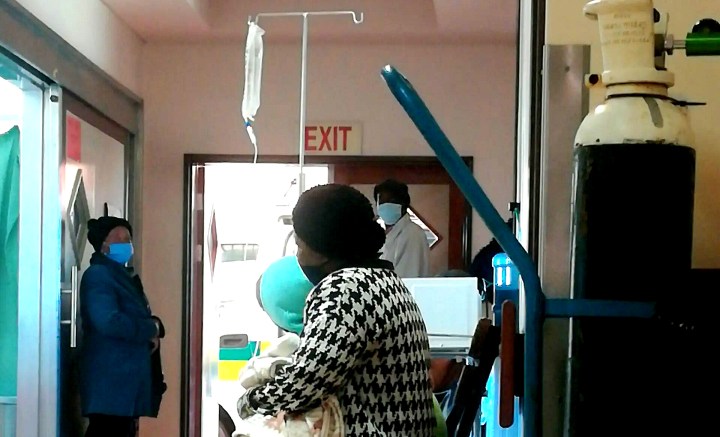
The North West Health Department was placed under administration in 2018 after failures of governance and allegations of fraud and corruption resulted in widespread service delivery protests. Now, as the period under administration is set to come to an end, Spotlight finds out if the situation has improved.
It has been almost four years since the North West Department of Health was put under administration, but some healthcare users in the province say improvement in health services has been negligible.
They complain about medicine shortages and a lack of ambulances that makes it difficult to access healthcare services, especially in rural areas.
The intervention
The North West Health Department was placed under administration on 25 April 2018 after failures of governance and allegations of fraud and corruption resulted in widespread service delivery protests.
The health department was one of 10 provincial departments placed under administration in terms of section 100 of the Constitution.
Section 100 allows national government to intervene in the running of provincial departments when a province cannot fulfil its functions.
In terms of section 100 (1)(b), the National Department of Health assumed the role and obligations of the provincial health department to ensure that the province meets the national standards for providing healthcare services.
To this end, Dr Jeanette Hunter, Deputy Director of Primary Healthcare in the National Department of Health, was appointed as administrator for the North West health department.
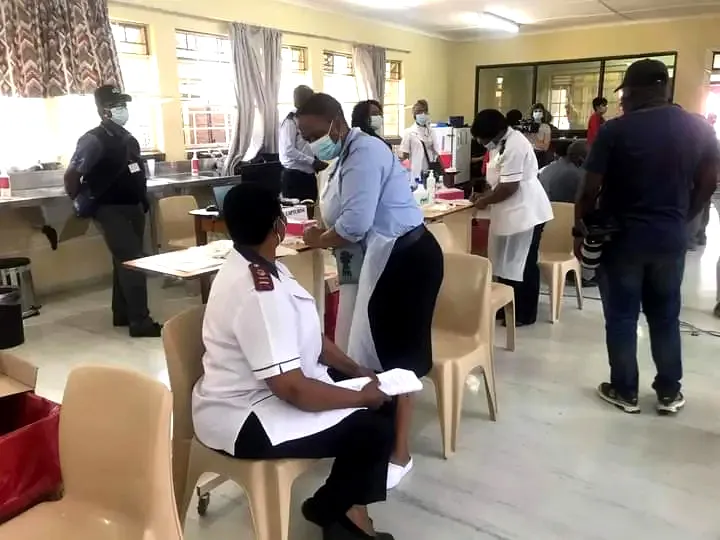
Unions are calling on the North West health department to appoint more healthcare workers. (Photo: GCIS / Spotlight)
Now, the section 100 intervention is expected to be lifted in the coming months. In March this year, Cooperative Governance and Traditional Affairs Minister Nkosazana Dlamini Zuma announced during a government imbizo in North West that an exit report had been sent to the National Council of Provinces to sign off, and that the section 100 intervention would be lifted for the 10 provincial departments. Dlamini Zuma heads the inter-ministerial task team appointed to oversee the intervention.
“The plan was never to stay here forever,” she reportedly told residents.
So what was the plan?
Recalling the state of affairs upon her appointment as administrator, Hunter tells Spotlight, “The entire administration was on the brink of collapse and workers were demonstrating, threatening to set alight departmental offices in various districts.”
Her first task, she says, was to bring stability to a health department she found in disarray.
“Workers were demanding performance management and development system incentives and the filling of vacant posts. They were angry because there was talk of millions being wasted through Gupta-linked companies such as Mediosa.
“The entire labour bargaining structure in the province had collapsed as staff members were demanding that vacant posts be filled,” says Hunter.
Since then, she says, there has been some improvement but challenges remain. Below we assess progress in five areas.
-
Some vacancies filled
“The vacancy rate has been brought down from 19% to 11%. Five thousand posts have been filled since the national government’s intervention. The intervention began with a workplan based on a diagnostic assessment.
“The workplan contains 111 activities and out of 111 tasks set out by the national health department, we have managed to complete 102 of them, which translates to a 92% success rate,” says Hunter.
Hunter says that when she was appointed as administrator, she found a staff organogram that was last updated in 2007.
Due to budget constraints, she says she was told by treasury that she could only increase staff numbers with funds that were available.
Meanwhile, presenting his 2022/23 budget speech last month, Health MEC Madoda Sambatha said 1,121 permanent posts were filled in the previous (2021/22) financial year, and that the progress made in filling posts will go a long way in improving the capacity of the department to effectively deliver on its mandate.
However, a report released last year by the community-led clinic monitoring group Ritshidze, highlighted that severe understaffing in the province has made the management of patient loads in clinics a challenge.
The report shows that out of 14 regularly monitored clinic sites, all the facility managers said they struggled with staff shortages.
To help address this, Sambatha said the department set up a database of unemployed health professionals in 2020. This week, when Spotlight enquired about this database, there were only 57 names on it.
Asked how many have been employed since 2020, Lekgethwane says, “The database currently does not remove those that have since been employed. This (57) is the total number since the database went live.”
-
Emergency medical services
One area that was flagged as a concern after the inter-ministerial task team’s oversight visit last year, was emergency medical services.
The National Council of Provinces’ ad hoc committee on the section 100 intervention in North West – upon adopting the oversight report in May last year – recommended that the task team “should ensure that the Minister of Transport, together with the Provincial Department of Community Safety and Transport Management, resolve the issues around the inability to promptly respond to provincial health transport needs, including the procurement and maintenance of the EMS fleet for the provincial Department of Health as soon as possible”.
Hunter says there has been some improvement. In 2018, she says, there were only 50 functional ambulances. This had increased to 147 by 2021.
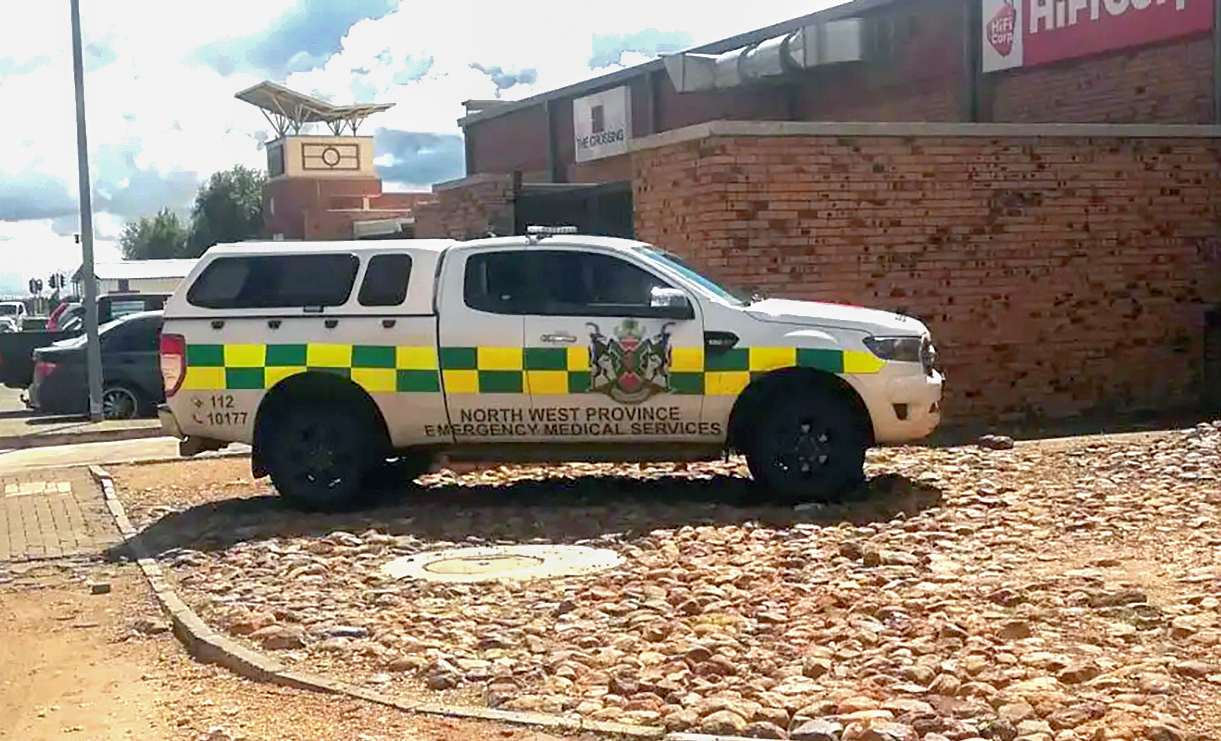
An Emergency Medical Services vehicle in North West. (Photo: Nthusang Lefafa / Spotlight)
In April 2018, Spotlight reported extensively on the controversial outsourcing of ambulance services in the province to a private company called Buthelezi EMS.
According to national standards, 350 EMS vehicles are required to service the province.
In his budget speech this year, Sambatha said he believes it will take up to seven years to reach this level. At present, the province is operating with 138 ambulances, he said.
Sambatha said the province is looking at a leasing model which will enable the department to increase its fleet using the same budget. This means the department will rope in private ambulances to help with patient loads, allowing the department to reach the national norm within two to three financial years, he said.
-
Record-keeping
According to Hunter, poor record-keeping remains a problem in the department because they are still using a manual system which leads to a delay in payments, keeping track of financial transactions and staff records.
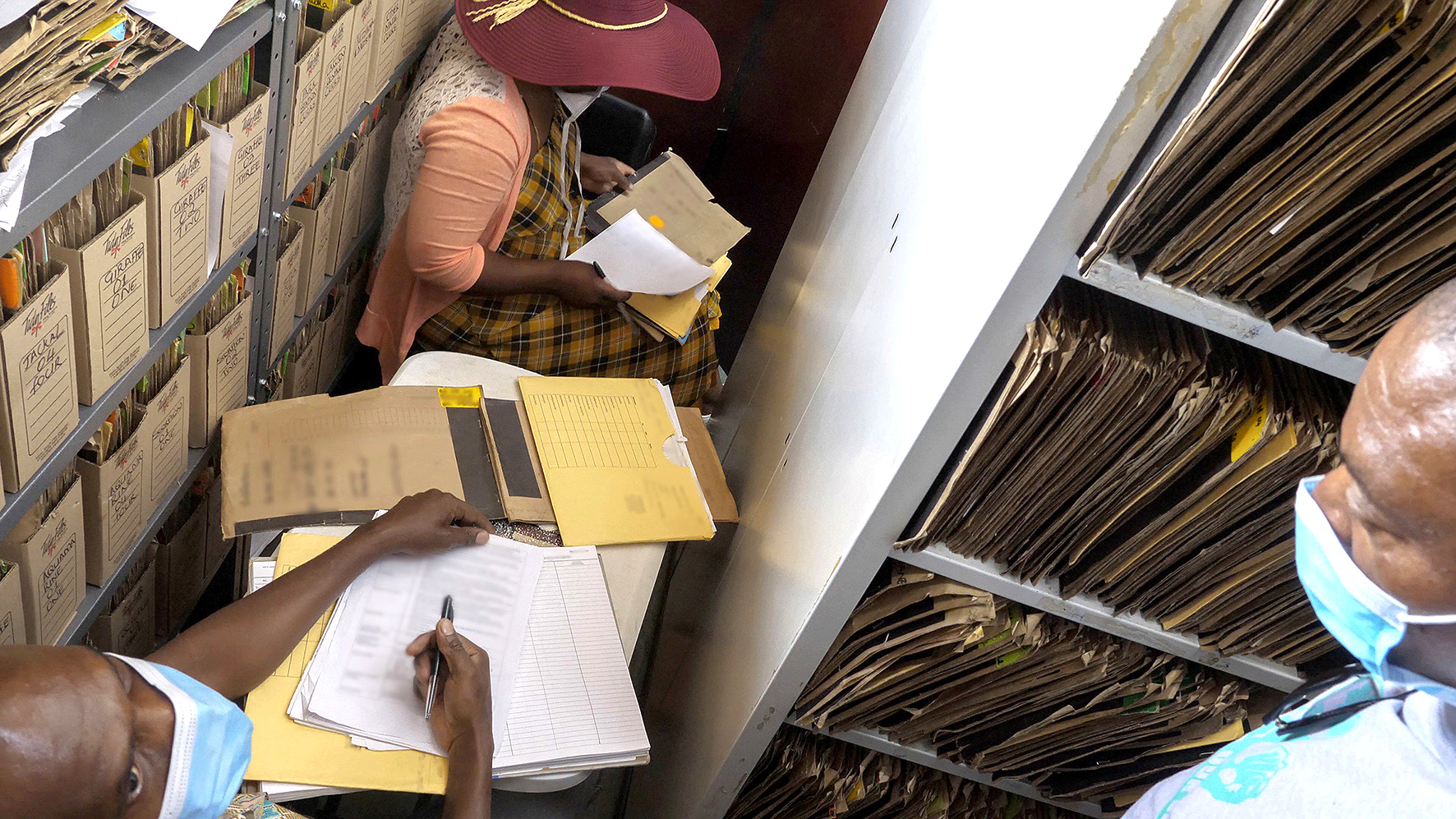
One of the big challenges remaining in the North West health department is that they still depend on a manual records system. (Photo: Rian Horn / Ritshidze / Spotlight)
She says when the Auditor-General comes to report, it sometimes takes longer than it should because their systems are not automated. She says a new system should be budgeted for and put in place.
In its report last year, the NCOP’s ad hoc committee also noted that improving ICT infrastructure and automation of the health department’s document management and information generation processes, are some of the challenges that still stick.
-
Medicine availability
Availability of medicine has also been a persistent challenge in the province. In its latest annual report for the 2021/22 financial year, the department’s healthcare support services programme “responsible for procurement, storage and distribution of medicines and surgical supplies, and other support services, achieved 74% against a target of 80% for medicine availability”.
In his budget speech, Sambatha referred to ending medicines stockouts as his “second mega health delivery intervention”.
“The department has continued with efforts to improve medicines and medical supplies availability to serve our communities,” he said.
By March 2022, he said the department “met its standard national average medicine availability target of 80.5%”.
“The different categories of medicines such as ARVs, [and] vaccines for child immunisations, remained above 90% since the third quarter, while the availability of TB medication was consistently above 80%.” Sambatha said the department also paid all its suppliers that were on hold since 2021/22 and this improved medicine availability.
But according to healthcare users like Lerato Modise, not all medicines are always available.
“I have to wake up at 5am on the day I visit the clinic [Ratlou Clinic]. If I don’t get a lift along the way, I have to walk nearly two kilometres. Sometimes I have to wait nearly six hours or spend the entire day at the clinic.
“In some instances, I come back with my baby not receiving her [immunisation] vaccine. I will then be told to come the following month,” says Modise.
Last year, Koketso Gaesal gave birth to her second daughter. She tells Spotlight that her child has skipped her infancy vaccines because nurses told her they weren’t available.
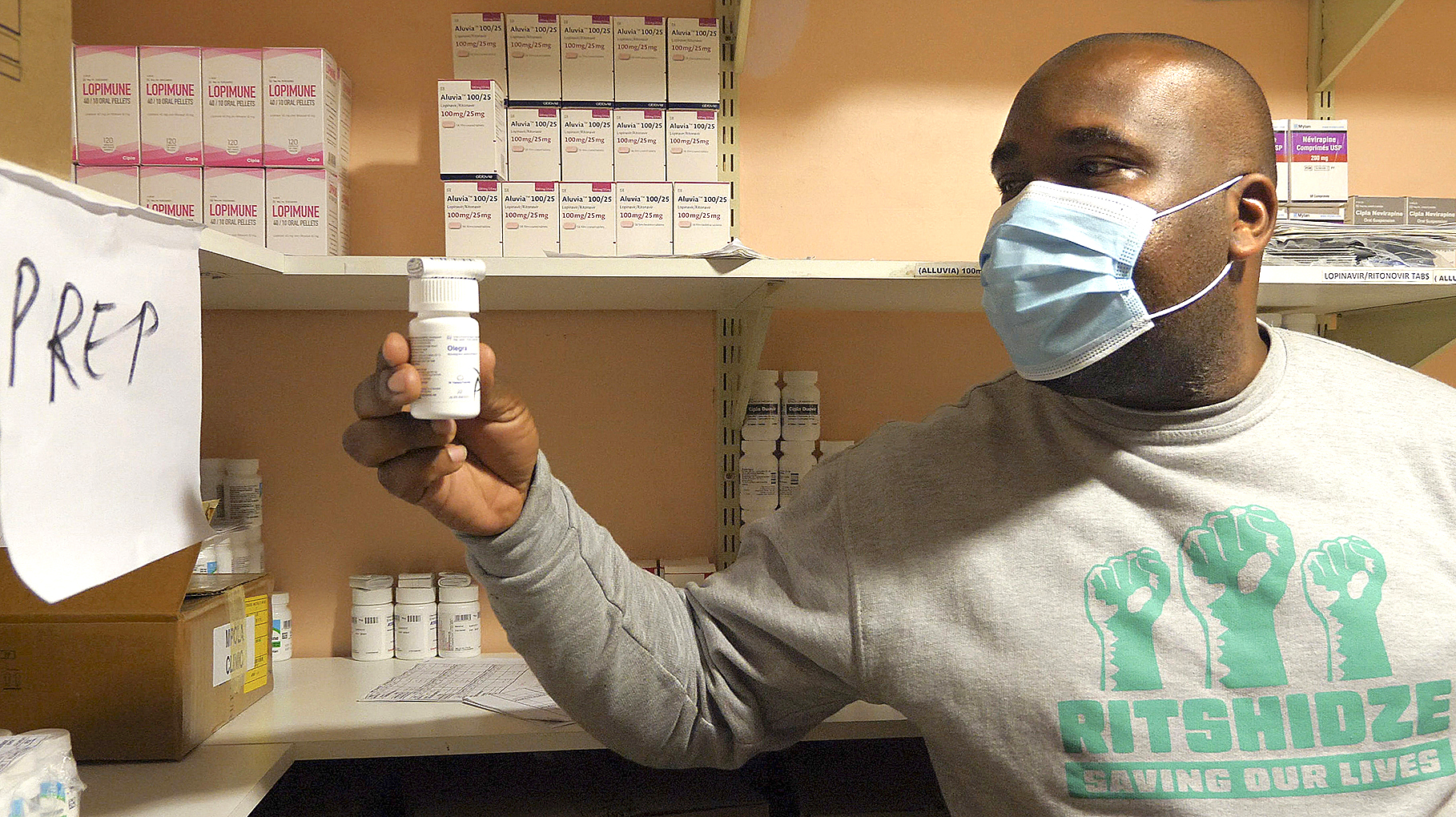
Medicine shortages are a persistent problem in North West. (Photo: Rian Horn / Ritshidze / Spotlight)
Since the closure of Thusong District Hospital, Gaesale says she has to spend R60 to travel to the General De La Rey Hospital in Lichtenburg because the Itsoseng CHC’s pharmacy is not licenced to dispense certain medication.
She says this makes her life difficult because she is unemployed and depends on a disability grant for her survival.
Kelebogile Kerileng, the EFF’s member of the provincial legislature, who serves on the health committee, says even though the department is under administration, there are still chronic medication shortages, infrastructure challenges and security issues at facilities across the province.
“During our oversight visits, we find that there are challenges relating to chronic medicine shortages – but the medication is available at the depot. This comes as a result of poor communication and confusion relating to deliveries.
“Some nurses say that clinics order from district hospitals and then the medication is sent to them. Only in case of emergencies can the clinic use its own transport to fetch medication at the depot, which operates on a 24-hour basis,” she says.
According to Lekgethwane, however, there is a plan in place to improve delivery timelines for medication. He says it involves direct deliveries of medication to hospitals, while the medical depot will deliver directly to clinics.
-
Money matters
Sambatha said in his budget speech that although the department had not grown its accruals over the past four years, it remains a concern. Accruals are funds that were supposed to be paid to suppliers in a specific financial year, but were carried over to the next financial year due to a lack of funding.
At present, annual accruals still hover around the R1.2-billion mark.
Though the North West treasury has allocated R350-million to help finance the accruals, the challenges of insufficient budget allocations remain, Sambatha said.
The department has also underspent its budget by 1%.
Lekgethwane tells Spotlight that of the roughly R14-billion health budget for the province in the 2020/21 financial year, the department underspent by R144-million.
He says the underspending was mainly on the health facilities’ revitalisation grant, which means money that the department had for new facilities, upgrades, refurbishments or maintenance was not spent in full.
“A request for a rollover on committed funds was granted during the adjustment budget by the provincial treasury,” he says.
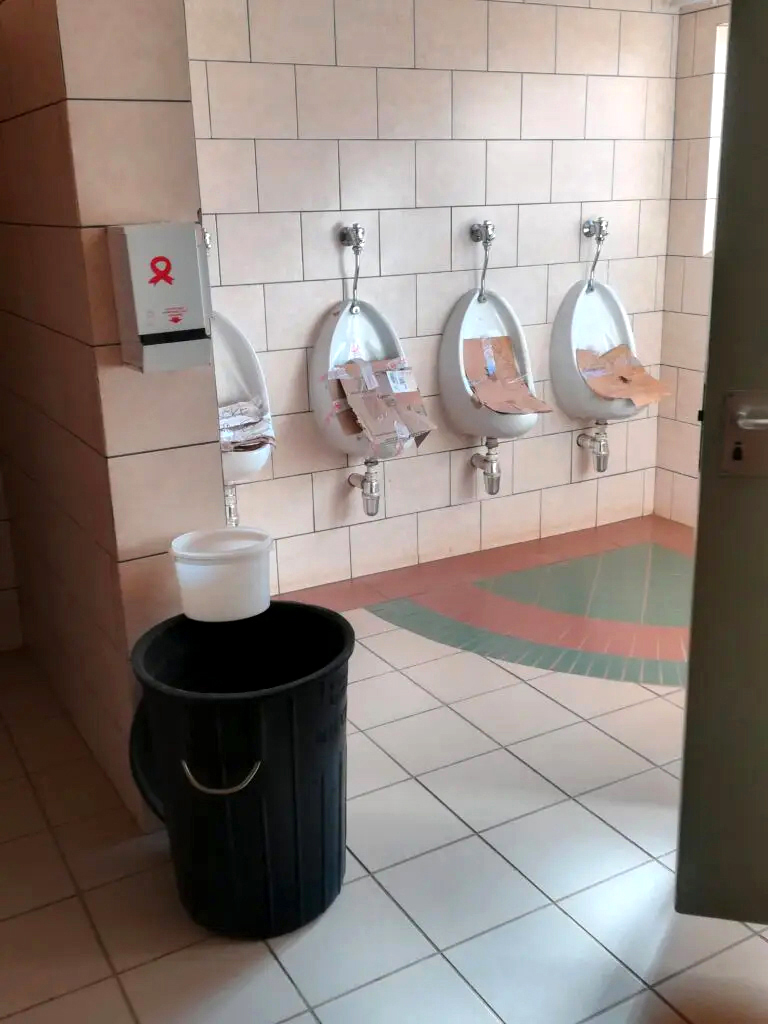
The state of some clinics in the North West. Here at Itsoseng Clinic, a rubbish bin is used to store water to flush the toilet. (Photo: Nthusang Lefafa / Spotlight)
According to Dr Oshupeng Maseng, a political science lecturer at North West University, government underspending means that “government has failed its people”.
“Under section 100, there are still monies in the North West that were returned to National Treasury. When money is being returned, there is no clear indication of improvement. It simply means that government has failed in terms of service delivery.
“If budget has been returned, it simply means that services have not been rendered,” says Maseng.
In its annual report, the department says it had put in place a Fraud Prevention Strategy, Fraud Prevention Plan, and an Anti-Corruption and Fraud Policy in the previous financial year.
The former head of department, Thabo Lekalakala, and several senior managers have been suspended pending the outcomes of disciplinary hearings.
Hunter says she would like to see the department continue to take disciplinary action against junior and senior employees so that those employed by the department know they are accountable for their actions.
Still room for improvement
Ntombizodwa Moepeng, provincial secretary of Nehawu, says there have been some changes since the department was placed under administration, but believes there is room for improvement.
“We have noted some improvement in terms of filling vacancies and fighting corruption within the department,” says Moepeng.
“Some workers are still complaining that they are overworked because some funded posts [for nurses] in public hospitals are still not filled since the department was placed under administration.”
Moepeng says the union would like to see community healthcare workers being employed on a full-time basis by the department.
She says some workers do not fully understand the Performance Management and Development System. This is an important part of the Public Service Regulatory Framework that guides the work and conduct of public servants in delivering services to the public.
She says in some instances you find supervisors completing reports that should be completed by workers. Moepeng says employees should be capacitated to fill out these forms themselves.
Dr Gilbert Asiranye, a medical practitioner who works in the province, says he has seen some of the work done over the past three years – but would still like to see more done.
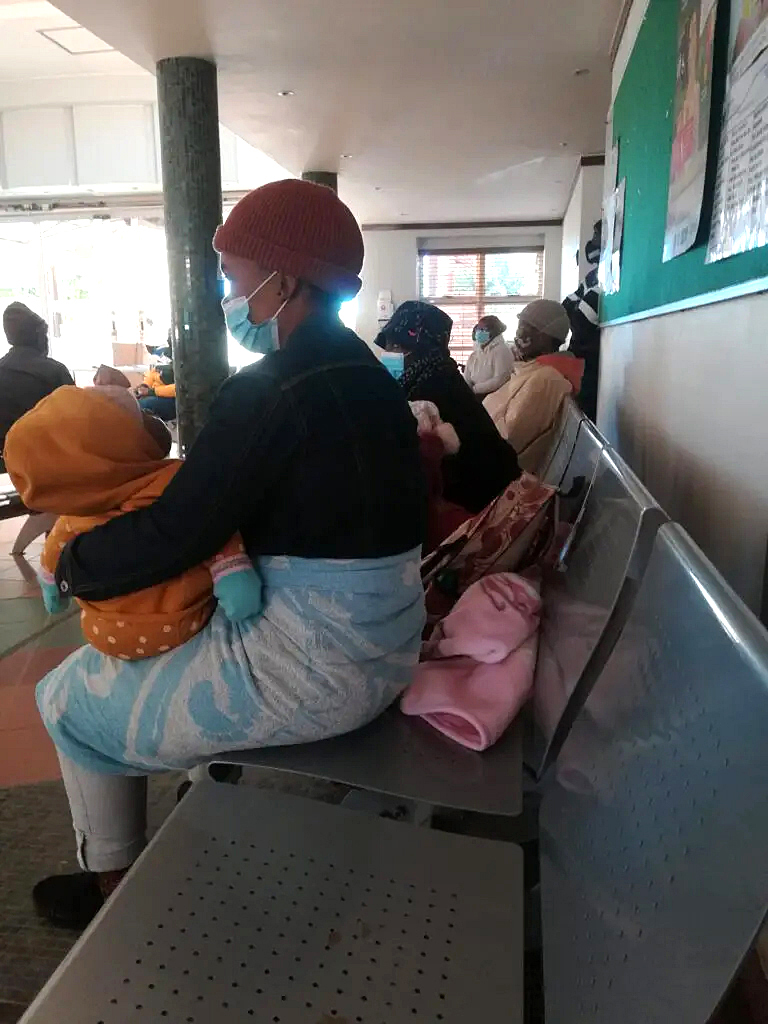
A patient waiting at Itsoseng Clinic in North West. (Photo: Nthusang Lefafa / Spotlight)
“I would like to see government providing enough finance to run all necessary and important programmes. More staff should be hired at clinics and hospitals so that workers should not feel overworked,” says Asiranye.
“Some challenges that are persisting in the department are a lack of skilled leadership with proper qualifications. Poor/dilapidated infrastructure with short staffing and unavailable resources are leading to poor service delivery.”
He says the department must improve recruitment since staff are overworked and eventually experience mental illnesses like depression. Ongoing training must also be a focus, he says. DM/MC
This article was published by Spotlight – health journalism in the public interest.





















 Become an Insider
Become an Insider
Comments - Please login in order to comment.